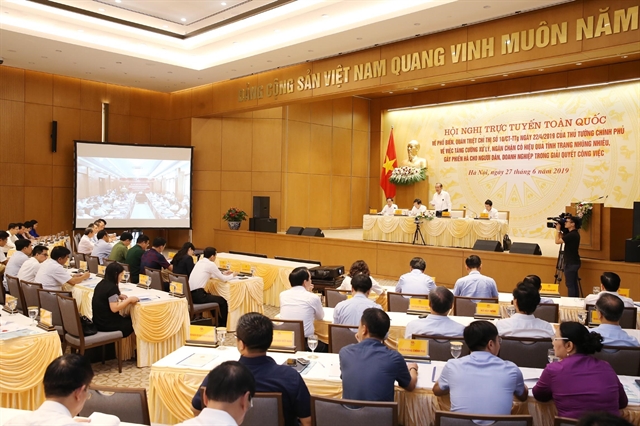 Society
Society


|
| Deputy Prime Minister Trương Hoà Bình on Thursday chaired a national online meeting on implementing Prime Minister’s directive on handling and preventing troubles made by State’s employees to public administrative users – Directive 10/CT-TTg dated in April, 2019. — VNA/VNS Photo Lâm Khánh |
HÀ NỘI — Fighting corruption must be considered a regular and enduring political task of every Party, State and Government agencies, Deputy Prime Minister Trương Hoà Bình has said.
Bình, who yesterday chaired an online meeting on handling trouble made by State employees to public administrative users, said anti-corruption must be a criteria to assess if Party, State and Government agencies fulfill their yearly tasks.
“Leaders of the agencies where corruption was detected must take responsibility,” he said.
Ministries, agencies and localities should identify key areas/stages or management positions that were prone to corruption so they could implement prevention and punishment, Bình said.
The Party, State, Government and people have made major efforts in recent times to crack down on corruption, particularly major corruption cases.
However, petty corruption or bribery during transactions between State employees and citizens and businesses was a long-lasting problem, he said.
“It’s petty corruption that erodes the trust of people, business and investors. It hinders the implementation of socio-economical development targets as well as national stability and development,” Bình said.
Ngô Minh Châu, vice chairman of HCM City People’s Committee, said that people and business still had many complaints about improper attitudes from State employees in public administrative transactions.
He said many citizens still believed bribery was necessary to ensure their transaction would go smoothly.
Deputy inspector general of the Government’s Inspectorate Trần Ngọc Liêm said one of the causes for petty corruption was leaders of agencies not paying enough attention to making a good example or they did not strictly punish violations.
In some cases, managers and leaders were too tolerant of their staff’s corruption, Liêm said.
Nguyễn Thanh Hải, chairwoman of the National Assembly's Ombudsman Committee, said petty corruption was seen daily in cases including public administrative services, school admission, healthcare services, applying for land-use right certificates, driving licences and traffic violations.
“Major corruption cases are strictly cracked down, which helps gain people’s trust for the country’s constitution, while petty corruption is eroding that trust,” she said.
Strong actions were needed to ensure that State employees “cannot corrupt”, “don’t want to corrupt” and “don’t dare to corrupt”, she said.
“Strict punishment could deter and make them not dare to be corrupt. If they receive proper salaries and good incentives, they would not want to be corrupt. Thus, the Government should streamline staff and increase salaries so State employees can properly afford their lives.
“When legal framework is completed, there will be no overlapping or legal holes to take advantage of, thus, people who intend to corrupt will not be able to be corrupt,” Hải said.
“People and business have said to me that they experience petty corruption in daily public services,” Hải said, questioning that why agencies’ leaders could say they did not know about the wrongdoing happening under their watch.
She said Prime Minister Nguyễn Xuân Phúc had clearly pointed out the roles and responsibility of leaders when corruption was found at their agencies.
“Strict implementation could help reduce petty corruption, bringing practical visible benefits for public service users,” she said. — VNS




